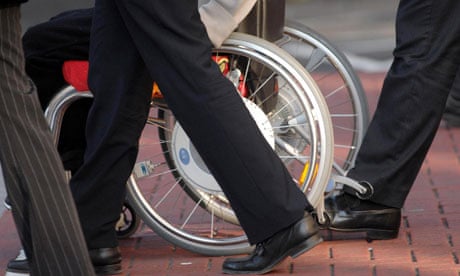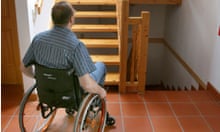Disabled people will be among the hardest hit by the comprehensive spending review. The chancellor announced savings of £2bn by limiting to one year the length of time people can claim the contributory element of employment support allowance (ESA).
ESA was brought in to replace incapacity benefit and supports people who are unable to work because of ill health or disability. These cuts mean that people who moved on to ESA and who previously worked will only be able to claim it for one year. At the moment, there is no time limit and people can claim ESA until they find another job.
After one year, people with assets, savings or partners who work will no longer receive benefits. Single people with no assets may be able to qualify for a means-tested safety net, but everyone else will have to manage on their husband or wife's salary – no matter how low it may be – or dip into any private savings they may have.
The change will affect hundreds of thousands of people, as 1.7 million Britons have moved from incapacity benefit to ESA. Many of them are likely to have been put on the contributory version of the benefit.
Critics said the announcement penalised people who had paid national insurance contributions for years precisely to cover them in the eventuality that they are unable to work through sickness or incapacity. They also said that the decision would make it much harder for disabled people to find jobs.
Those entitled to ESA get access to specialist support to help them find employment, such as advice on CVs and interviews.
Richard Hawkes, chief executive of the disability charity Scope, said: "The government has not delivered on its promise to support disabled people into work, penalising those on ESA and jobseekers' allowance who have worked and paid national insurance in the past and who now cannot rely on getting the support they need when they need it, in an increasingly difficult employment market. Disabled people and their families do not have 'broad shoulders', so why are they bearing the brunt of these cuts?"
The spending review also hit benefits for the 380,000 disabled people living in care homes. The government intends to save £135m by cutting the mobility component in disability living allowance for people in residential care.
This is the money that helps disabled people get to the shops or visit their families. With no mobility funding, disabled people with no family or friends nearby will in effect become prisoners in their care homes, unable to get out at all.
Guy Parckar, acting director of policy and campaigns at the charity Leonard Cheshire Disability, said: "This is a fundamentally unfair change that could have a hugely detrimental impact on thousands of disabled people, leaving many effectively trapped in their homes, unable to afford to go out.
Many people in residential care already have their income capped at £20 a week once their care has been paid for and rely on the mobility benefit to be more independent.
This change will hit one of the most vulnerable groups in society," said Parckar.










